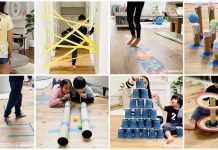[ad_1]
The cages in each wing open out into common areas to use portable rest rooms. The overhead lighting in the warehouse stays on around the clock.
The Border Patrol said close to 200 people inside the facility were minors unaccompanied by a parent. Another 500 were “family units,” parents and children. Many of the adults could be charged with illegal entry and placed in jail, away from their children.
Reporters were not allowed by agents to interview any of the detainees or take photos.
Nearly 2000 children have been taken from their parents since Attorney-General Jeff Sessions announced the policy, which directs Homeland Security officials to refer all cases of illegal entry into the United States for prosecution. Children are not prosecuted, which results in famileis being separated.
Loading
Church groups and human rights advocates have sharply criticised the policy, calling it inhumane.
Stories have spread of children being torn from their parents’ arms, and parents not being able to find where their kids have gone. A group of congressional lawmakers visited the same facility on Sunday and were set to visit a longer-term shelter holding around 1500 children, many of whom were living separately from their parents.
“Those kids inside who have been separated from their parents are already being traumatised,” said Democratic senator Jeff Merkley of Oregon, who was denied entry earlier this month to children’s shelter. “It doesn’t matter whether the floor is swept and the bed sheets tucked in tight.”
In Texas’ Rio Grande Valley, the busiest corridor for people trying to enter the US, Border Patrol officials argue that they have to crack down on migrants and separate adults from children as a deterrent to others.
“When you exempt a group of people from the law … that creates a draw,” said Manuel Padilla, the Border Patrol’s chief agent here. “That creates the trends right here.”
In this photo provided by U.S. Customs and Border Protection, people who’ve been taken into custody related to cases of illegal entry into the United States, sit in one of the cages at a facility in McAllen, Texas, Sunday, June 17, 2018.
Photo: AP
Agents running the holding facility – generally known as “Ursula” for the name of the street it’s on – said everyone detained is given adequate food, access to showers and laundered clothes, and medical care. People are supposed to move through the facility quickly. Under US law, children are required to be turned over within three days to shelters funded by the Department of Health and Human Services.
Padilla said agents in the Rio Grande Valley have allowed families with children under the age of five to stay together in most cases.
An advocate who spent several hours in the facility Friday said she was deeply troubled by what she found.
Michelle Brane, director of migrant rights at the Women’s Refugee Commission, met with a 16-year-old girl who had been taking care of a young girl for three days. The teen and others in their cage thought the girl was two years old.
“She had to teach other kids in the cell to change her diaper,” Brane said.
The staff gave her books and toys, but they were not allowed to pick her up, to hold her or hug her to try to calm her
Brane said that after a lawyer started to ask questions, agents found the girl’s aunt and reunited the two. It turned out that the girl was actually four years old. Part of the problem was that she didn’t speak Spanish, but K’iche, a language indigenous to Guatemala.
“She was so traumatised that she wasn’t talking,” Brane said. “She was just curled up in a little ball.”
Brane said she also saw officials at the facility scold a group of five-year-olds for playing around in their cage, telling them to settle down. There are no toys or books.
But one boy nearby wasn’t playing with the rest. According to Brane, he was quiet, clutching a piece of paper that was a photocopy of his mother’s ID card.
“The government is literally taking kids away from their parents and leaving them in inappropriate conditions,” Brane said. “If a parent left a child in a cage with no supervision with other five-year-olds, they’d be held accountable.”
Dr. Colleen Kraft, the head of the American Academy of Pediatrics, said that she visited a small shelter in Texas recently, which she declined to identity. A toddler inside the 60-bed facility caught her eye. She was crying uncontrollably and pounding her little fists on mat.
Staff members tried to console the child, who looked to be about two years old, Kraft said. She had been taken from her mother the night before and brought to the shelter.
The staff gave her books and toys, but they were not allowed to pick her up, to hold her or hug her to try to calm her. As a rule, staff aren’t allowed to touch the children there, she said.
“The stress is overwhelming,” she said. “The focus needs to be on the welfare of these children, absent of politics.”
AP
Table of Contents
ToggleMost Viewed in World
Loading
Morning & Afternoon Newsletter
Delivered Mon–Fri.
[ad_2]







